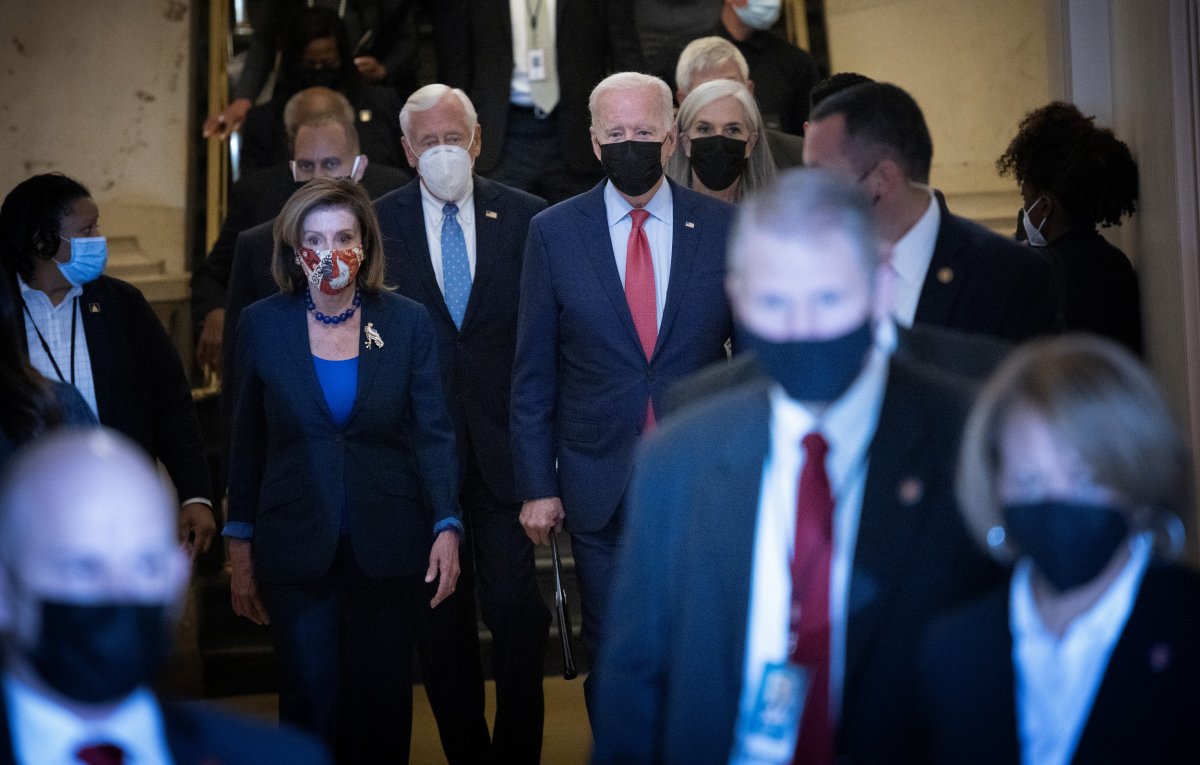As the House and Senate return from recess this week, congressional Democrats are gearing up for a year-end sprint to unify their fractured caucus behind a spending bill that's crucial to President Joe Biden's agenda, and make deals on raising the debt limit and government spending to avoid a federal shutdown.
Further complicating matters, the House select committee investigating the January 6 Capitol riot will hold a vote Tuesday on a recommendation report for the Justice Department to bring charges of criminal contempt against former President Donald Trump's adviser, Steve Bannon, for flouting a congressional subpoena issued last month.
Infrastructure and Spending Bills
When congressional lawmakers return to Capitol Hill, the Democratic-controlled House and Senate will have only 10 legislative days to meet House Speaker Nancy Pelosi's October 31 deadline to pass both the $1.2 trillion bipartisan infrastructure bill and a multi-trillion-dollar spending bill known as the Build Back Better Act.
The infrastructure vote was delayed earlier this month amid a standoff between progressives and moderates in the party over the size, scope and priorities of the $3.5 trillion spending bill, which Biden expects to shrink to $2 trillion. Both sides are still yet to agree on a final price tag.
Among the major investments, the "hard infrastructure" bill includes funding for roads and highways, bridges, broadband development, water support, and airport projects. The "human" spending bill provides funding to fight climate change, Medicare expansion, and free two-year community college.
Progressive leaders and moderates still need to iron out sticking points in the larger package, including health care expansion, funding to reduce climate change, and limits on the price of prescription drugs.
Democratic leadership intends to pass both bills in tandem. With a narrow majority in the House and an evenly split Senate, Pelosi could delay the vote again to December if the party is unable to reach a consensus.
Looming Government Shutdown and Debt Ceiling Disaster
With hours left until a partial shutdown, Biden signed a short-term spending bill into law on September 30 to keep the federal government funded until December 3—the new deadline for Congress to pass another funding bill.
Democrats pushed through the temporary measure amid a showdown with Republicans over lifting the debt ceiling, a limit on the amount the federal government is permitted to borrow.
A default, which has never once occurred throughout U.S. history, would have a disastrous impact on the nation, individual states, and global economies.
Republicans refused to help raise the debt ceiling, insisting it's the "sole responsibility" of Democrats due to the power they hold in the White House and both chambers of Congress. However, they did agree to help Democrats overcome a procedural hurdle and pass a temporary extension to fund the government through December 3.
"I write to inform you that I will not provide such assistance again if your all-Democrat government drifts into another avoidable crisis," Senate Minority Leader Mitch McConnell said in a letter to Biden.
Democrats need at least 10 Senate Republican votes to pass the measure. Both parties now have until the new deadline to negotiate their unresolved partisan stalemate.
Bannon's Contempt Vote
A Democratic-controlled House select committee investigating the events of January 6 is expected to vote Tuesday to recommend charges of criminal contempt against Steve Bannon for defying a congressional subpoena.
If approved, the full House must then vote on the recommendation report. If it passes the House, the report will be sent to the Department of Justice, which will make the final decision on whether to enforce the prosecution.
The face-off with Bannon is just one element of an escalating congressional probe into the Capitol insurrection, with over a dozen subpoenas issued so far and a lack of compliance among Trump allies.
Democrats have vowed to aggressively challenge Bannon's defiance, signaling their determination to avoid the lengthy standoffs that occurred under the Trump administration over congressional subpoenas.
During Trump's four years in office, legal battles over the flouting of subpoenas continuously delayed attempts to examine his White House and federal agencies.

Uncommon Knowledge
Newsweek is committed to challenging conventional wisdom and finding connections in the search for common ground.
Newsweek is committed to challenging conventional wisdom and finding connections in the search for common ground.
About the writer
To read how Newsweek uses AI as a newsroom tool, Click here.








